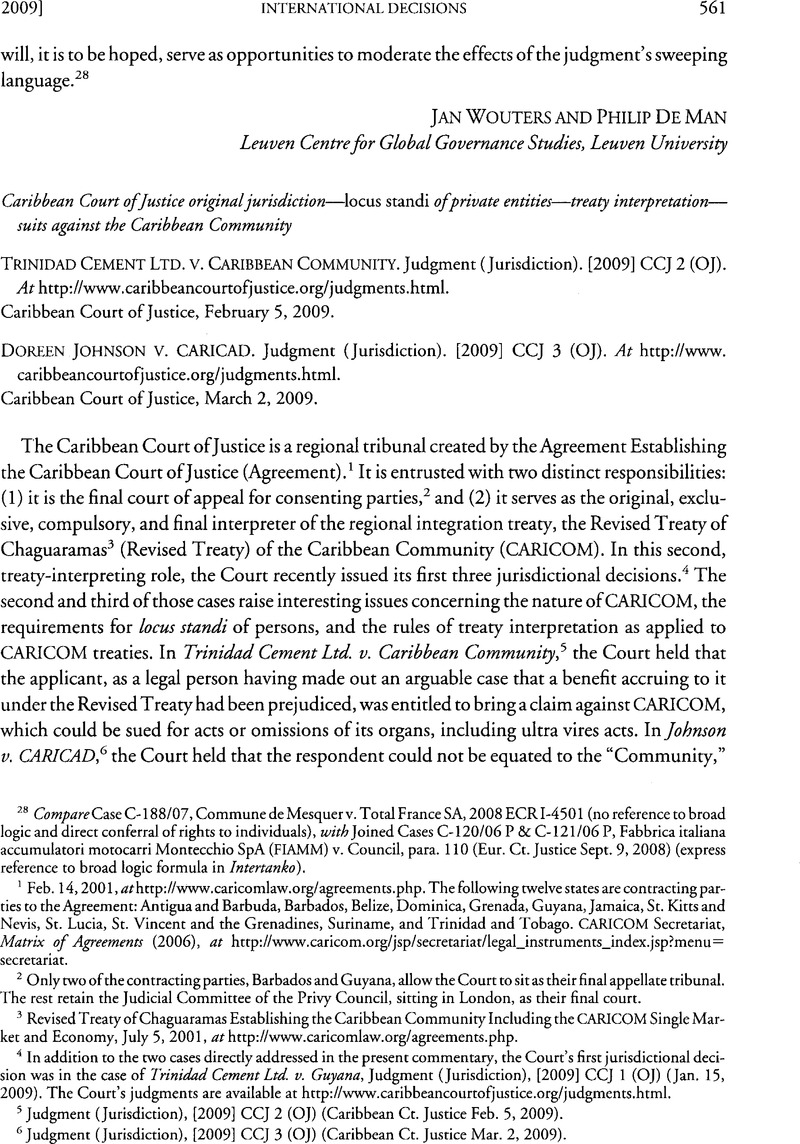No CrossRef data available.
Article contents
Trinidad Cement Ltd. v. Caribbean Community; Doreen Johnson v. CARICAD
Published online by Cambridge University Press: 10 March 2017
Abstract

- Type
- International Decisions
- Information
- Copyright
- Copyright © 2009 by The American Society of International Law
References
1 Feb. 14,2001, at http://www.caricomlaw.org/agreements.php. The following twelve states are contracting parties to the Agreement: Antigua and Barbuda, Barbados, Belize, Dominica, Grenada, Guyana, Jamaica, St. Kitts and Nevis, St. Lucia, St. Vincent and the Grenadines, Suriname, and Trinidad and Tobago. Caricom Secretariat, Matrix of Agreements (2006), at http://www.caricom.org/jsp/secretariat/legal_instruments_index.jsp?menu=secretariat.Google Scholar
2 Only two of the contracting parties, Barbados and Guyana, allow the Court to sit as their final appellate tribunal. The rest retain the Judicial Committee of the Privy Council, sitting in London, as their final court.
3 Revised Treaty of Chaguaramas Establishing the Caribbean Community Including the Caricom Single Market and Economy, July 5, 2001, at http://www.caricomlaw.org/agreements.php.Google Scholar
4 In addition to the two cases directly addressed in the present commentary, the Court’s first jurisdictional decision was in the case of Trinidad Cement Ltd. v. Guyana, Judgment (Jurisdiction), [2009] CCJ 1 (OJ) (Jan. 15, 2009). The Court’s judgments are available at http://www.caribbeancourtofjustice.org/judgments.html.
5 Judgment (Jurisdiction), [2009] CCJ 2 (OJ) (Caribbean Ct. Justice Feb. 5, 2009).
6 Judgment (Jurisdiction), [2009] CCJ 3 (OJ) (Caribbean Ct. Justice Mar. 2, 2009).
7 Supra note 4.
8 Id., para. 28.
9 Article 221 provides: “Judgments of the Court shall constitute legally binding precedents for parties in proceedings before the Court unless such judgments have been revised in accordance with Article 219.”
10 Article 82 provides: “The Member States shall establish and maintain a common external tariff in respect of all goods which do not qualify for Community treatment in accordance with plans and schedules set out in relevant determinations of COTED.”
11 The Court held in Trinidad Cement Ltd. v. Guyana, para. 32, that although the Revised Treaty does not always expressly confer rights or benefits to persons, such rights or benefits may be derived from correlative obligations imposed upon the contracting parties: “Where an obligation is [imposed on Member States (or a class of Member States) collectively], it is capable of yielding a correlative right that enures directly to the benefit of private entities throughout the entire Community.”
12 Article 187 provides:
The provisions of this Chapter [on “Disputes Settlement”] shall apply to the settlement of disputes concerning the interpretation and application of the Treaty, including:
-
(a)
(a) allegations that an actual or proposed measure of another Member State is, or would be, inconsistent with the objectives of the Community;
-
(b)
(b) allegations of injury, serious prejudice suffered or likely to be suffered, nullification or impairment of benefits expected from the establishment and operation of the [CARICOM Single Market and Economy];
-
(c)
(c) allegations that an organ or body of the Community has acted ultra vires; or
-
(d)
(d) allegations that the purpose or object of the Treaty is being frustrated or prejudiced.
13 In Trinidad Cement Ltd. v. Guyana, para. 33, the Court held that in determining whether each of the two conditions in Article 222(a) and (b) can or will be satisfied, the standard of proof is that of an “arguable case.”
14 The attorney general acknowledged receipt of Trinidad Cement’s correspondence and simply stated that “its contents have been noted” (para. 38).
15 Since its inception, less than a handful of cases before the European Court have been brought by one member state against another. See, e.g., Craig, Paul & Grálnne, De Búrca EU Law: Text, Cases, and Materials 451–52 (4th ed. 2008).Google Scholar
16 May 23, 1969,1155 UNTS 331.
17 Trinidad Cement Ltd. v. Guyana, paras. 11, 38.
18 Id., para. 18. In another telling passage, id., para. 13, the Court stated that the Caricom Single Market and Economy “is intended to be private sector driven.”
19 The European Court of Human Rights has started to address such problems in its jurisprudence. See, e.g., Waite v. Germany, 1999-1 Eur. Ct. H.R. 393.
20 Case 26-62, Van Gend & Loos v. Nederlandse Administratie der Belastingen, 1963 ECR 1.




